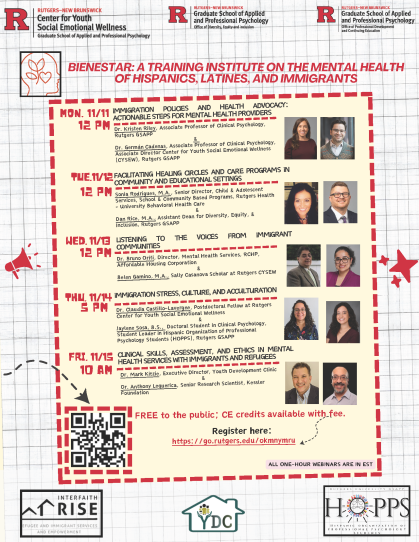Bienestar Training Institute on the Mental Health of Hispanics, Latines, and Immigrants

---------------------------------------------------------------------------------------
Immigration Policies and Health Advocacy: Actionable Steps for Mental Health Providers
Date: Monday, November 11
Time: 12 - 1pm ET
Instructors: Kristen Riley, PhD & Germán Cadenas, PhD
The presentation will provide an overview of recent community-based research documenting how anti-immigrant policies are harmful to the wellbeing of immigrants from Latin America, including those who are undocumented, recipients of the Deferred Action for Childhood Arrivals (DACA) program, and refugees. Responding to this, immigrants may develop resilience by engaging in systems level advocacy and community activism to promote humane immigration policies. This presentation reviews the evidence for how advocacy and activism promote psychological wellbeing among immigrants. Models for collaborative advocacy and community engagement will also be reviewed to support psychologists as they aim to promote psychological healing with immigrant communities.
Learning Objectives
- To identify the connection between immigration policy and psychological wellbeing of Latinx immigrants and refugees.
- To identify coping strategies used by Latinx immigrants and refugees to respond to policy-based hostility.
- To describe emergent models of immigration advocacy designed for mental health providers.
----------------------------------------------------------------------------------------------------------
Facilitating Healing Circles and Community Care Programs
Date: Tuesday, November 12
Time: 12 - 1pm ET
Instructors: Sonia Rodriguez, LPC, LMFT, LCADC, ACS & Dan Rice, M.Ed.
The power of coming together as a community during times of uncertainty or pain cannot be overstated. This session will focus on best practices to run community-based programs that support Latinx and immigrant communities. Specifically, we will begin by introducing some of the basic components of restorative justice practices to create spaces for checking-in and promoting community healing. Additionally, we will discuss best practices for facilitating community-based programs that support Latinx and immigrant communities. These will include both community-based and school-based programs. This is an introductory-level session, and no previous experience in restorative justice work is required. We hope you will join us.
Learners will be able to:
- Identify three different types of restorative justice circles,
- Describe the five steps to facilitating a community healing circle,
- Identify best practices for building effective collaborations between schools, community organizations, and local agencies to create a comprehensive support system.
--------------------------------------------------------------------------------------------------------------
Listening to the Voices from Immigrant Communities
Date: Wednesday, November 13
Time: 12 - 1pm ET
Instructors: Bruno Oriti, PhD, Belen Gamino, BS, & Panelists
Presentation will focus on the value and ways that immigrants of different status use their voice and the purpose, process, and value of listening to immigrants to the United States. This discussion will be rooted in the healing traditions of voice/stories and in the processes of narrative authorship. The processes highlighted challenge unjust power differences and encourage collaboration across power and cultural differences. Two migrants (one DACA status, one Refugee status) will express their story and the role of using their voice as a path to healing and creating community in the U.S. Presenter and audience participation will be encouraged in a framework purposeful participation seeking to undo the consequences of unjust community practices relating to DACA and refugee practices in the U.S.
Participants will be able to:
- Be able to formulate a model of purposeful listening and an empowering and justice driven process of narrative construction to utilize when interacting with DACA and refugee status people.
- Describe the cultural context of their own voice and effectively direct the purpose and relationship to immigrant communities when conversing with them and on their behalf.
- Competently converse with people entering the US under conditions of forced migration.
----------------------------------------------------------------------------------------------------
Immigration Stress, Culture, and Acculturation
Date: Thursday, November 14
Time: 5 - 6pm ET
Instructor: Claudia Castillo-Lavergne, PhD & Jaylene Sosa, BS
In this presentation we will critically examine and explore psychological and social factors that contribute to culture, acculturation, and immigrant stress. Additionally, we will delve into the implications of this research for immigrant mental health and well-being.
Learning objectives
- Critically examine the sociocultural and political landscape of immigration in the United States.
- Discuss how concepts of culture, acculturation, and cultural wealth in relation to immigrant well-being shape identity, resilience, and well-being.
- Analyze the impact of immigration stress on individuals and communities. Identify key stressors, their consequences, and potential strategies for prevention and intervention.
------------------------------------------------------------------------------------------------------
Clinical Skills, Assessment, and Ethics in Mental Health Services with Immigrants and Refugees
Date: Friday, November 15
Time: 10 - 11am ET
Instructor: Mark Kitzie, PsyD & Anthony Lequerica, PhD
Immigrants, refugees, and asylum seekers (IRA) commonly experience significant stress and a lack of support which render them vulnerable and subject to life-long health consequences. This presentation will serve as an introduction to providing mental health services for the IRA population. There will be an emphasis on understanding the IRA experience and presentation of symptoms through a cultural lens and how to improve cultural competence for those working with this population. Common factors that underly mental health problems such as acculturative stress and immigration trauma will be addressed. Typical obstacles to mental health access for this population such as mental health stigma, distrust of service systems, and cultural and linguistic differences, as well as ways to overcome these barriers will be presented. There will be a focus on identifying mental health needs using practical tools and strategies to undertake screening and assessment for this population. Finally, ethical guidelines in working with this population will be addressed.
LEARNING OBJECTIVES: At the conclusion of this activity, participants will be able to:
- Identify 2 commonly used mental health screening procedures for refugees and immigrants
- List 4 common precipitants of mental health problems of immigrants and refugees
- Identify 3 common barriers to mental health care for immigrants and refugees and strategies to overcome them.
- Describe some sources of cultural bias in cognitive tests
- Describe the importance of appropriate normative data
